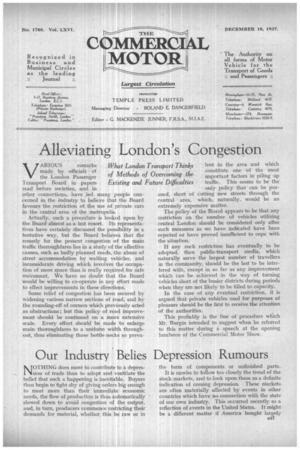Alleviating London's Congestion
Page 33

If you've noticed an error in this article please click here to report it so we can fix it.
What London Transport Thinks of Methods of Overcoming the Existing and Future Difficulties
ARIOUS remarks made by officials of the London Passenger Transport Board in papers read before societies, and in other connections, have led many people concerned in the industry to believe that the Board favours 'the restriction of the use of private cars in the central area, of the metropolis.
Actually, such a procedure is looked upon by the Board almost as a last resort. Its representatives have certainly discussed the possibility in a tentative way, but the Board believes that the remedy for the present congestion of the main traffic thoroughfares lies in a study of the effective causes, such as badly planned roads, the abuse of street accommodation by waiting vehicles, and inconsiderate driving which involves the occupation of more space than is really required for safe movement. We have no doubt that the Board would be willing to co-operate in any effort made to effect improvements in these directions.
Some relief of congestion has been secured by widening various narrow sections of road, and by the rounding-off of corners which previously acted as obstructions; but this policy of road improvement should be continued on a more extensive scale. Every effort should be made to enlarge main thoroughfares to a uniform width throughout, thus eliminating those bottle-necks so preva lent in the area and which constitute one of the most important factors in piling up traffic. This seems to be the only policy that can be pur cutting new streets through the which, naturally, would be an sued, short of central area, extremely expensive matter.
The policy of the Board appears to be that any restriction on the number of vehicles utilizing central London should be considered only after such measures as we have indicated have been rejected or have proved insufficient to cope with the situation.
If any such restriction has eventually to be adopted, then public-transport media, which naturally serve the largest number of travellers in the community, should be the last to be interfered with, except in so far as any improvement which can be achieved in the way of " turning vehicles short of the busier districts during periods when they are not likely to be filled to capacity.
In the case of any eventual restriction, it is argued that private vehicles used for purposes of pleasure should be the first to receive the attention of the authorities.
This probably is the line of procedure which Mr. Burgin intended to suggest when he referred to this matter during a speech at the opening luncheon of the Commercial Motor Show.


































